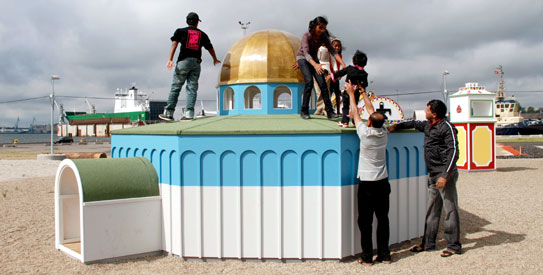
FREDERICIA: Children skip across the roof of a mosque and play hide and seek in a Hindu temple: this unsual playground is designed to build tolerance as religious relations are cooling in Denmark.
Volunteers from various faiths in Fredericia helped to create the seaside playground, which opened in August in a town proud of its 18th-century role as a refuge for Europe's persecuted.
There is a green mosque with a golden dome, a red and white brick village church and a brightly coloured Hindu temple.
“It is fun to see what a mosque looks like and a Hindu temple and to play with children from other religions,” says nine-year-old Caroline as she scrambles among the model buildings.
And the playground is a great way for parents to introduce their children to other religions and cultures, says Hanne Ravn, in her 50s, who lives in a neighbouring village.
“It is important for parents to talk to their children, to teach them to be tolerant and open to others, from a young age,” she says.
Caroline has never been inside a real mosque. And there is little chance she will in Denmark anytime soon, since a project to build the country's first mosque in Copenhagen has been delayed amid financial problems and rumours that it was being financed by Tehran.
Islam is the second largest religion in Denmark, which counts more than 200,000 Muslims among its some 5.5 million inhabitants.
But relations with the Muslim minority, who make up about 3.5 percent of the population, have become tense since Danish daily Jyllands Posten in 2005 first published 12 caricatures of the Prophet Mohammed that were considered blasphemous and insulting.
The cartoons, including one depicting Mohammed wearing a turban shaped like a bomb with a lit fuse, sparked massive and in some cases deadly protests across the Muslim world, as well as boycotts of Danish companies, threats against Danish interests abroad and attempted attacks on both Jyllands-Posten and one of the cartoonists.
Several Muslim countries have also demanded an official apology from the Danish government, which it has repeatedly rejected, stressing the importance of freedom of expression in the country.
At the same time, the far-right Danish People's Party – a key ally of the centre-right government – has significantly increased its anti-Muslim rhetoric, warning of the alleged “Islamisation” of Denmark and Europe.
And a survey published in August showed that nearly 55 percent of Danes believe Islam is an obstacle to social harmony.
In such an atmosphere, observers say the Fredericia playground project is an important one.
“It is good to through tolerance seek to prevail over prejudice,” says Mehdi Mozaffari, a professor of Islam and Islamism at the Aarhus University.
Other, smaller religious groups may not face the same stigmatisation as Islam, but due to their small followings in the Scandinavian country, most people still have little idea what they stand for.
That is what is so good about the new Fredericia playground, according to Joydal Sritharan, a 12-year-old Dane of Sri Lankan origin and one of very few Hindus living in Denmark.
“It allows us, through games, to learn more about other religions,” he says.
Sritharan's grand uncle Antoni, a Hindu patriarch visiting from the Netherlands, agrees.
“It is a good thing to teach children other ways to get to know each other,” he says.
A notable absence from the new playground is a synagogue, even though Fredericia was in the early 18th-century the first city to accept Jews in Denmark, where the the Evangelical Lutheran Church of Denmark is the official state religion.
Denmark today counts some 7,000 Jews, and Caroline's grandmother, retired teacher Bente Christensen, says it is peculiar they are not represented at the playground, especially considering the town's history.
“Fredericia had in the past the second largest Jewish community in Denmark after Copenhagen, and it was their refuge during the 1700s,” she says.
But she is nevertheless “enchanted by this place which invites dialogue between religions and learning about tolerance.” Organisers of the project insist the lack of a synagogue in the playground was not intentional.
All faiths were asked to participate, but due to their small number, the Jewish community “did not respond to our invitation,” explains Protestant pastor Karina Dahlmann.
Fredericia mayor Thomas Banke is mindful of the religious disputes behind so many of the world's conflicts.
“This is why it is essential to teach children that religion must be used not for killing each other, but to talk to each other, play together, whatever our beliefs,” he tells AFP, adding he's proud municipal funds contributed to the “bridge between religions” playground.
The town of 50,000 people is today home to more than 100 nationalities, says the mayor, adding he hopes the pioneering playground “will be copied and will contribute to making the world a more tolerant place for the next generations.”










































